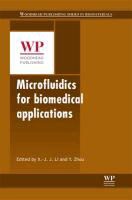Read more
Informationen zum Autor XiuJun (James) Li! Ph.D.! is a tenure-track assistant Professor in the Department of Chemistry! Border Biomedical Research Center! and Materials Science & Engineering at University of Texas at El Paso (UTEP). After he obtained his Ph.D. degree in microfluidic single-cell analysis with Prof. Paul Li from Simon Fraser University (SFU) in Canada in 2008! he pursued his postdoctoral research in integrated microfluidic devices for genetic analysis with Professor Richard Mathies at UC Berkeley! and low-cost diagnosis with Professor George Whitesides at Harvard University! while holding an Postdoctoral Fellowship from Natural Sciences and Engineering Research Council (NSERC) of Canada. He has gained extensive experiences in bioanalysis using microfluidic systems! such as single-cell analysis! genetic analysis! low-cost diagnosis! pathogen detection! 3D cell culture! and so on. Dr Li's research interest is centered on the development of innovative microfluidic technologies and nanotechnologies for bioanalysis and bioengineering. He has authored about 30 publications! including 2 book chapters. His research has been funded by National Institute of Health (NIH)! UT System! UTEP! State Key Laboratory of Bioreactor Engineering of China and other agencies. He is the recipient of Dean of Graduate Studies Convocation Medal (SFU) in 2009! and UT STARS award in 2012. Yu Zhou! Ph.D.! is a Research Scientist in the Department of Research and Development at ABS Global Inc.! USA. Dr Zhou received his Ph.D. degree in mechanical engineering from University of Illinois at Chicago in 2010. After graduation! he joined ABS Global! the world-leading genetics provider company as a key researcher and has been working on the development of a high-throughput microfluidic cytometry for biological cell detection and manipulation. He obtained extensive experience in design and fabrication of silicon-based microsystems and disposal plastic microfluidic chips! precision fluid delivery! and microfluidics-based single cell separation and analysis. He is a member of ASME and serves on the advisory editorial board for several technical journals including Microsystem Technologies! and Journal of Mechanical Engineering Research (Canada) since 2011. Klappentext This important book discusses the fundamentals of microfluidics and will provide information on a wide range of medical applications. Zusammenfassung This important book discusses the fundamentals of microfluidics and will provide information on a wide range of medical applications. Inhaltsverzeichnis Part 1 Fundamentals of microfluidic technologies for biomedical applications: Materials and methods for the microfabrication of microfluidic biomedical devices; Surface coatings for microfluidic-based biomedical devices; Actuation mechanisms for microfluidic biomedical devices; Digital microfluidics technologies for biomedical devices. Part 2 Applications of microfluidic devices for drug delivery and discovery: Controlled drug delivery using microfluidic devices; Microneedles for drug delivery applications; Microfluidic devices for drug discovery and analysis. Part 3 Applications of microfluidic devices for cellular analysis and tissue engineering: Microfluidic devices for cell manipulation; Microfluidic devices for automated micro-robotic cell injection and trapping; Microfluidic devices for developing tissue scaffolds; Microfluidic devices for stem cell analysis. Part 4 Applications of microfluidic devices in diagnostic sensing: Development of immunoassays for protein analysis on nanobioarray chips; Integrated microfluidic systems for genetic analysis; Low-cost assays in paper-based microfluidic biomedical devices; Microfluidic devices for viral detection; Microfluidics for monitoring and imaging pancreatic islets and a-cells; Microfluidic devices for radio chemical synthesis. ...

